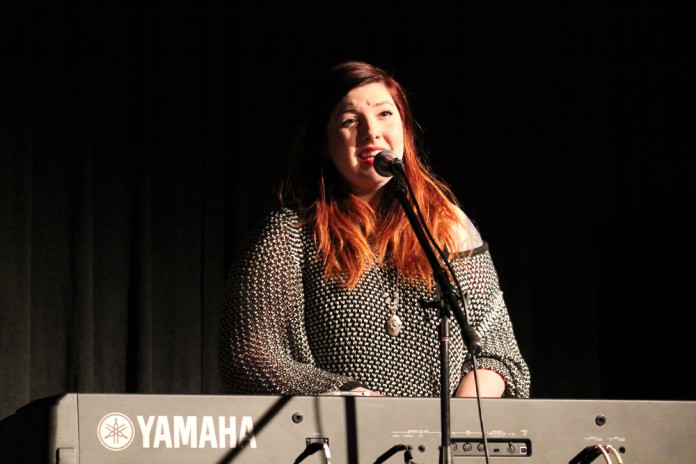Cindy Chan
Staff Writer
Photo by Ivy Kuo
The Hub was abuzz with show-goers braving the night chill on the evening of Thursday, Jan. 9, in anticipation of the soulful voice that anchored the 2013 gay rights anthem “Same Love,” by Macklemore and Ryan Lewis. With her delicately crafted words and melodies, the stunning, red-lipped singer-songwriter and spoken word artist Mary Lambert left audience members entranced and emotionally excavated.
The show was put on by University of California, Santa Barbara’s Women, Gender & Sexual Equity Department (WGSE); Promoting Awareness, Victim Empowerment (PAVE); and Associated Student Queer Commission. The night was a showcase of songs from Lambert’s latest extended play, “Welcome to the Age of my Body,” released this past December by Capital Records, as well as her self-released 2012 EP “Letters Don’t Talk.”
The artist captivated the crowd with her deeply personal material, inviting listeners to explore their vulnerability alongside hers. There was no shortage of tear-brimmed eyes and solemn expressions as Lambert dished out some pretty heavy material, most notably on her spoken word pieces “Bodylove” and “Girl with the Purple Hair.” Set to the steadily crescendoing chords of a keyboard, her poetry projected personal experiences, including the topics of rape, molestation, self-harm, and body image. The pain dripped heavily from her music and lyrics, as the songstress retold and relived her harrowing stories. Audience members were visibly moved, having entered a place of hurt and sorrow that Lambert’s work so frequently visits.
“To her, the show is more than just her job,” said second-year economics major Lilia Yuan. “It’s a way for her to connect with everyone and express herself as someone other than just another simple performer.”
Lambert had a wicked ability to evoke both tears and laughter within seconds, and the show mirrored the artist’s struggles. In the touching song “Born Sad,” Lambert shared her experiences with bipolarity, and the gloomy “Sarasavarti” touched upon suicide. Lambert’s honestly painful lyrics, in conjunction with her bluesy angelic voice, shined during “Forget Me” and “Beautiful Bird.” Lambert’s touching lyrics, soft yet growly vocals, and folksy, slightly jazzy keyboard combined to produce an authentically stunning sound.
Lambert sprinkled humorous anecdotes throughout the show, which balanced out the overall sense of sadness. Laughter erupted as she candidly described her grandmother’s adoration of a 7-year-old mandolin player from the ’90s rather than of her own granddaughter, a successful musician. The singer also shared a Video Music Award story, entertainingly describing a post-performance harassment she received from a security guard, in which a Glee cast heroically defended the singer’s honor.
The night was embellished with some lighter tunes, inducing some serious musical feels in the form of head-bobbing. “I Could Be” described the saccharine innocence of pursuing love, “Red Lipstick” belted about a stoner ex-girlfriend, and a cover Wheatus’s “Teenage Dirtbag” provided some tuneful nostalgic refrain.
Lambert’s quirky charm was undeniably key to the show’s success. Although the emotional intensity of the night was probably unexpected by most, audience members gushed about the show by the end of the night. People were able to genuinely connect to the painfully relatable content in the pieces; Lambert ascribed words and melodies to otherwise inexpressible feelings. Through her unrestrained honesty about experience, Lambert was able to foster a sense of love and understanding among listeners.
“A big portion of being a good performer is being a good storyteller,” said second-year mechanical engineering major Wilson Liang. “Mary’s poems capture the struggles within teenage hearts, her voice reveals the scars on you, yet encourages you to appreciate life and be unapologetically yourself.”
The night closed with an encore performance of “She Keeps Me Warm,” a song grown from the roots of the hook Lambert wrote for “Same Love.” In this epic performance, audience members sang along to the celebrated chorus and the night was sealed with advocating self-love and acceptance.
Lambert’s show delivered a message: stop seeking validation within social pressures that force us to depict skewed versions of faultless human beings. We should instead choose to admit perfection in our faults, welcoming authenticity and self-renewal. Through the potent artistic display of complete vulnerability, another well-needed message was reinforced thoroughly. That is, it is acceptable to experience sorrow, and admitting the experience can be as beautifully courageous as Lambert’s music.











